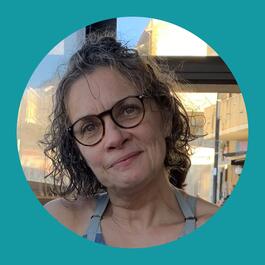
Eleanor Rutter, Compassionate Sheffield
Eleanor Rutter is Assistant Director of Public Health at Sheffield City Council, and Leader of Sheffield’s Compassionate Sheffield programme. A talented mathematician as a child, Eleanor went to medical school out of a need to seek the approval of other people. Following a complicated pregnancy, she was away from work as a hospital doctor for 18 months, after which she went into public health. She had a further two children and time off through mental ill-health, and the training programme, nominally five years, took her 12 years to complete. She had a false start in an authority with what she feels was an ‘over-medicalised’ model of public health, but has now found her feet in what she describes as her “dream job.” In her current role, Eleanor leads the Compassionate Sheffield programme. It is in fulfilment of the city’s 2018 public health objective to ensure that everyone has a dignified death in a place of their choice. She soon found out that there were a lot of compassionate communities doing good work in this area. Eleanor’s approach is informed by the academic work of Professor Allan Kellehear at the University of Bradford. It recognises dying as a social and spiritual process first and foremost, rather than a medical one. She says that communities and neighbourhoods are best placed to allow people to live the complete lives they choose to value. Eleanor’s team comprises two community development workers, one of which is an end-of-life doula, a communications officer, a clinical lead, and a programme manager. They are funded by Public Health Sheffield City Council, the ICB (Integrated Care Board), and St Luke’s Hospice. She says the team is an enabler, building capacity, confidence and connections within and between communities. The main strands of the team’s work to date have been advance care planning, developing training to help people navigate the end of life, building ‘death literacy’ through death cafes, and leading Sheffield’s covid memorial project. Atul Gawande’s book ‘Being Mortal’ has also had a strong influence on Eleanor’s thinking. She says that by not listening to people and over-medicalising their problems we are at risk of stripping away their humanity. The next stage for Compassionate Sheffield is to build on the work that people did in the pandemic as compassionate neighbours. In the longer term, Eleanor feels that compassion runs through everything we do and its potential is far greater than transforming the end of life. For example, in Sheffield’s economic anchor organisations many people are in a conversation with Michael West concerning compassionate leadership. She says “I don’t think it’s just a silly pipe dream, this idea of Sheffield becoming a compassionate city in its entirety.” Sheffield has not intentionally diverged from the Frome Model, which is the basis of Compassionate Communities UK. Rather, Sheffield’s Health and Wellbeing Board, aware of the compassion that was already manifest in Sheffield’s communities, wanted to grow Compassionate Sheffield using an asset-based approach. As white and middle class, Eleanor is very conscious of her privilege. Therefore, she has a problem with the term ‘achievements’ and feels that often she has just needed to “scoop up the opportunities that were given to me.” Only two or three times in her career has she been faced with making a genuinely tough choice, which on one occasion involved insisting on doing the right thing even though her position was unpopular with some very senior colleagues. Through therapy Eleanor has learnt to see life as a learning process. One of the things she has learnt is the power of saying sorry and actually meaning it. Eleanor credits therapy as being the experience that has changed her the most. She put herself “heart and soul” into it. It was gruelling, but she is “massively transformed” and no longer driven by self-loathing. Otherwise,...
From "The Compassionate Leadership Interview"


Comments
Add comment Feedback